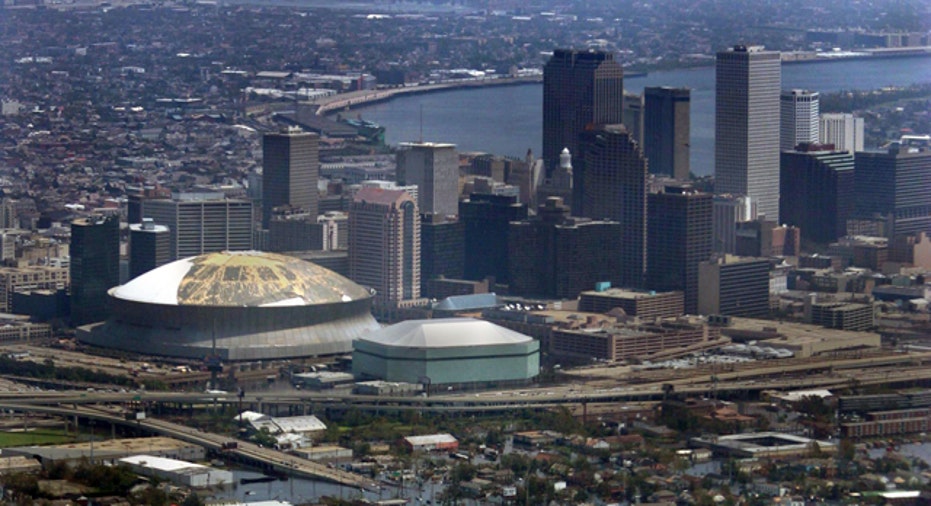Will the Hornets Be Next to Flee New Orleans?

Stung by mounting franchise debt, the Big Easy’s nasty post-Katrina hangover and an overwhelming preference for the NFL's Saints, the New Orleans Hornets may soon be forced to skip town.
This threat was highlighted earlier this week when the National Basketball Association swept in to take over the Hornets, making it the first franchise to be owned by the league.
With Seattle, Kansas City and other cities waiting in the wings, the NBA may opt to move the franchise to a more viable market, dealing another blow to a region struggling to get off the mat from Hurricane Katrina.
“It [would] be an incredibly politically unpopular thing to do, but the NBA is running a business. They have to make sure they are catering to the long-term asset-building of the NBA owners,” said David Carter, a sports business professor at USC and author of Money Games.
'Buried in Debt'
There is considerable doubt New Orleans can support more than one pro sports team, especially one not named the Saints, the National Football League’s reigning Super Bowl champs. After all, many fans and companies fled after Katrina and the city and state don’t appear to be in a position to offer the team enough incentives.
Without a buyer to keep the team in New Orleans, George Shinn sold the Hornets to the NBA for a reported $300 million on Monday. The NBA pledged to do its best to stay in the city, but that may be a tall order.
After spending a dozen years in Charlotte, the Hornets moved to New Orleans in 2002, but relocated temporarily to Oklahoma City in the wake of Katrina.
Since returning full time in 2007, the franchise has struggled financially. According to records leaked to Deadspin.com, the team’s long-term debt stood at $111 million at the end of 2009. In fact, interest payments of $8.9 million on that mounting debt wiped out a 2009 operating profit of $5.9 million.
“The debt load is overwhelming. They’re just buried in debt,” said Marshall Glickman, former president of the Portland Trail Blazers and CEO of G2 Strategic.
Shrinking Demand, Super Competition
The team’s fanbase was hit hard by Katrina, which killed more than 1,800 people in the Gulf Coast in 2005 and displaced about 300,000 people. Another factor is New Orleans's 23% poverty rate, which may be the city’s lowest in decades but is still almost double the national average.
The corporate scene has also changed dramatically as just 13 publicly traded companies call New Orleans home today, down from 22 pre-Katrina, according to New Orleans CityBusiness. For example, miner Freeport McMoRan (NYSE:FCX) and energy company McDermott (NYSE:MDR) left the city for Phoenix and Houston, respectively.
Right now, power company Entergy (NYSE:ETR) is the city’s only Fortune 500 company, and all of Louisiana has just three, according to CityBusiness.
It’s no matter that most companies left for other reasons than Katrina. The lack of a major corporate presence in New Orleans is a big issue because pro teams rely on companies to buy crucial revenue-generating products like premium seats and luxury suites.
What minimal fan and corporate support New Orleans can offer tends to skew toward the Saints, who have a long history in the city.
The NFL’s presence “creates an obstacle” for the Hornets because there is “no question the Saints hold a special place in people’s hearts here,” said Gabe Feldman, director of Tulane’s Sports Law program.
Feldman believes the Hornets could benefit from the Saints’ recent success as the team’s owner, Tom Benson, is spearheading a major downtown development project.
And Feldman doesn’t believe the obstacles are insurmountable, in part because the city has already “proven it can support both” teams.
“There’s no question it’s more challenging to run any business post-Katrina…That doesn’t mean it’s not a viable case,” he said.
The Hornets would be greatly helped by assistance from taxpayers, but with other, arguably more important needs, neither the city nor the state appears to be in a position to use public funds on the team. In particular, the Hornets could use help in reworking their lease at New Orleans Arena that expires in 2014. The lease includes an opt-out clause in 2011 if attendance thresholds aren’t met.
The NBA’s takeover of the Hornets is not unprecedented in sports as the National Hockey League acquired the Phoenix Coyotes amid similar difficulties last year and Major League Baseball took over the Montreal Expos in 2002.
If Not New Orleans, Where?
If it is unable to find a buyer to keep the team in town, the NBA will need to consider its next move.
One unlikely option is contraction, in which the Hornets would disappear altogether. But that seems improbable because the player’s union would never agree.
“The NBA is looking to expand and globalize; not to shrink,” said Feldman. More likely, the NBA will accept a deal to move the Hornets out of New Orleans.
With its large, affluent population and history of NBA basketball, Seattle is cited as an attractive destination. But the city needs a new venue, which is why the SuperSonics skipped town for Oklahoma City in 2008.
Kansas City is also seen as a candidate because it already has the Sprint Center, a state-of-the-art arena that opened in 2007 without a pro tenant. However, KC’s market is somewhat crowded by the presence of the NFL’s Chiefs and MLB’s Royals.
That’s not to say the Hornets should be packing their bags for Seattle or elsewhere just yet. It just means the odds appear to be stacked up against the Big Easy.
“If it’s very well managed and if they are able to reestablish themselves with credibility that they are long-term committed to the market, then it’s possible it can work in that market,” said Glickman. “But those are a lot of ifs.”



















